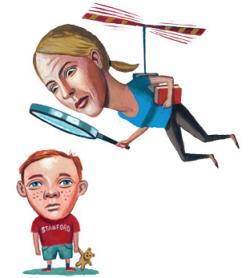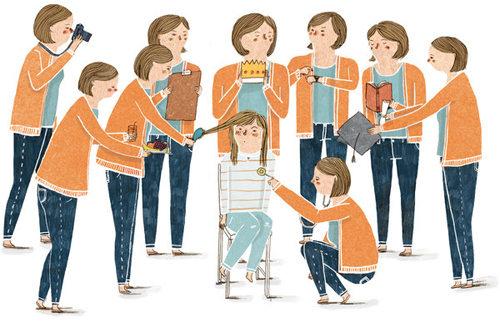 Your parents unload you into your new college dorm room. You say your goodbyes, anxious to start this new chapter of your life and watch as your parents pull out of the parking lot, your mom wiping away tears and your dad waving goodbye one last time. *Sigh of relief* No longer than twenty minutes go by and your mom is calling your phone to see what exciting things you have done since she has been gone and so it begins. Your mom suffers from a common phenomena known as helicopter parenting.
Your parents unload you into your new college dorm room. You say your goodbyes, anxious to start this new chapter of your life and watch as your parents pull out of the parking lot, your mom wiping away tears and your dad waving goodbye one last time. *Sigh of relief* No longer than twenty minutes go by and your mom is calling your phone to see what exciting things you have done since she has been gone and so it begins. Your mom suffers from a common phenomena known as helicopter parenting.
Your parents have been your primary caregivers since the moment you were born; kissing your scrapes, ensuring you finished your fruit and vegetables, and arguing with teachers for any “unreasonable” grade you earned. Now it is time for you to make your own decisions and guide your life how you see fit, but they can not seem to let go. Helicopter parents first became recognized in Dr. Haim Ginott’s book Parents and Teenagers, released in 1969. Parents would hover over their children, hence the term helicopter, and take responsibility for all of their children’s success and failures, feeling the need to be in complete control.

While parents can easily give teenagers roam to breathe and create a healthier relationship, they may feel the need to hover for a number of reasons including overcompensation from their neglected childhood, anxiety about the direction of the future, peer pressure from other parents, and the fear of negative consequences that can be resolved with their actions. Parents may believe their parenting style is the best for their child, but studies have found that children of helicopter parents have struggled to deal with stress and anxiety, and have been more prone to a narcissist attitude. Children who were raised by overprotective parents may feel unworthy and lack self-confidenc
e and in return pick up unhealthy habits such as smoking and binge drinking. Although hovering over a child is unhealthy for their development and may lead to an unhappy future, parents do need to have a role in their child’s life. Instead of taking control of their child’s life, they can guide them with their own experiences and advice, but ultimately leaving the decisions up to the child.
A helicopter parent needs to first identify their problem and the negative affects it may have on the child and their relationship. Once a parent understands the risks, they can start to give the child more independence. They should let the child work out his own problems and not intervene unless it becomes dangerous. The child may fail at landing that job or passing a class, but the parents should just encourage him to start again rather than try to solve the mistake themselves.
Provide support and reassurance that he is capable of succeeding without the help of a parent. Avoid using excuses to justify your child’s actions and give them more responsibilities, that if not met they are disciplined. It may be hard for a helicopter parent to relinquish all control, but with some time it is possible and will lead to both the child and parents happiness. 

I LOVE THIS POST. I was just complaining to my aunt that my parents are constantly checking up on me despite the fact that I live a little over three hours away. I received a text yesterday from my mom asking if I skipped class because I didn’t text her at seven that morning. I didn’t skip class because that’s the only day I don’t have an 8 am class but I felt the hovering (and nagging) of my parents. Although I disagree with the third paragraph in general because it doesn’t really fit me I think that this topic is really interesting and I’m definitely sending it to my parents (in hopes they’ll back off a bit).